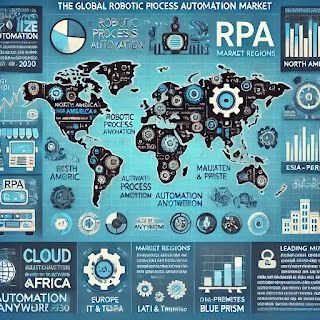Updated Report: UiPath
Overview: UiPath is a global leader in robotic process automation (RPA) and intelligent automation, offering end-to-end automation capabilities. Positioned as the highest-designated Leader in the 2024 Everest Group Intelligent Automation Platforms PEAK Matrix® Assessment, UiPath continues to drive innovation, expand its ecosystem, and deliver value to enterprises worldwide.
Financials:
Revenue: UiPath reported strong financial performance in its most recent earnings release, with revenues reaching $1.06 billion for the fiscal year, marking a year-over-year growth of 18%.
Profitability: Operating margins have improved as UiPath focuses on cost optimization and scaling its subscription-based model.
Cash Flow: The company maintains a robust cash position, with over $1 billion in cash and cash equivalents.
Forecast: Analysts project steady growth, with revenue expected to increase by 15-20% in the next fiscal year, driven by enterprise adoption of automation solutions.
Technology Advancements:
Unified Automation Platform: The UiPath Platform™ integrates RPA with advanced AI capabilities, such as machine learning, natural language processing, and intelligent document processing.
Agentic Automation: UiPath is leading advancements in agentic automation, empowering software agents to autonomously execute complex workflows with minimal human oversight.
AI-Powered Features: Recent updates include enhanced capabilities for process mining, AI-driven insights, and seamless integration with enterprise applications like SAP and Salesforce.
Developer Tools: UiPath continues to expand its ecosystem with tools for developers, including StudioX for citizen developers and advanced debugging features for IT professionals.
Business Partners, Clients, and Customers:
Business Partners: UiPath has strong partnerships with major tech players like Microsoft, AWS, and Google Cloud, enabling seamless integration into cloud ecosystems.
Clients: Its customer base spans industries including finance, healthcare, manufacturing, and retail. Key clients include Coca-Cola, PwC, Verizon, and Chevron.
Customer Success: The company has achieved a Net Promoter Score (NPS) of over 70, reflecting high customer satisfaction.
Institutional Investors:
Top Investors: Institutional investors like BlackRock, Vanguard Group, and Ark Investment Management hold significant stakes in UiPath.
Recent Activity: Increased interest from ESG-focused funds highlights UiPath’s commitment to sustainability and ethical AI.
Stock Performance:
Ticker Symbol: PATH (NYSE)
Recent Performance: UiPath shares have shown resilience, with a year-to-date increase of 12%.
Market Sentiment: Analysts maintain a positive outlook, with a consensus price target of $25, representing an upside potential of approximately 20%.
Valuation Metrics: UiPath trades at a price-to-sales ratio of 10, reflecting strong growth expectations.
Competitive Moat:
Technological Leadership: UiPath’s unified platform and advancements in AI and automation ensure it remains at the forefront of intelligent automation technology.
Extensive Ecosystem: Partnerships with major cloud providers and compatibility with enterprise systems create a strong integration ecosystem.
Developer and Citizen Developer Ecosystem: Tools like StudioX and Automation Hub cater to a broad range of users, fostering widespread adoption.
Network Effects: A large customer base enhances value through shared knowledge and innovation.
High Switching Costs: Enterprises face significant retraining and reintegration challenges if they switch away from UiPath, creating customer retention.
Market Diversification: Clients across multiple industries reduce dependency on any single sector.
Acquisition Targets:
If UiPath were to pursue acquisitions, likely targets could include:
Process Mining Companies: Firms like Celonis or smaller players that enhance process discovery capabilities.
AI Startups: Companies specializing in NLP or advanced AI, such as Hugging Face or niche AI startups.
Enterprise Integration Firms: Smaller firms enabling integration with platforms like SAP and Salesforce.
Vertical-Specific Automation Players: Companies focusing on automation for industries like healthcare or manufacturing.
Cybersecurity Automation Startups: Firms automating cybersecurity workflows.
Low-Code/No-Code Development Platforms: Companies like OutSystems to appeal to non-technical users.
Plans for Future Growth:
Geographic Expansion: UiPath aims to deepen its presence in emerging markets, including Asia-Pacific and Latin America.
R&D Investment: The company plans to allocate $300 million annually toward R&D to maintain technological leadership.
Acquisitions: UiPath is exploring strategic acquisitions to bolster its AI and machine learning capabilities.
Workforce Expansion: It intends to increase its headcount by 10% in 2024, focusing on AI engineers and customer success professionals.
Sustainability Initiatives: UiPath is integrating green practices in its operations, aiming to achieve carbon neutrality by 2030.
Conclusion:
UiPath remains a strong investment prospect, driven by its technological leadership, expanding market share, and robust financial health. With a clear roadmap for innovation and growth, UiPath is well-positioned to capitalize on the increasing adoption of intelligent automation across industries.










